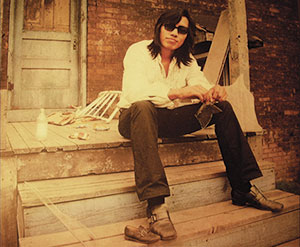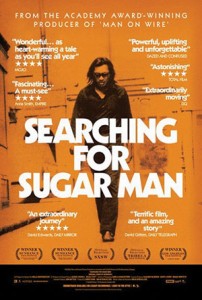
Sugar Man found. Rodriguez brings his timeless music to a Somerville audience this Friday evening.
By Blake Maddux
In his 1992 song Talking New Bob Dylan, singer-songwriter Loudon Wainwright III sings about how record labels sought with impatient greed to sign a worthy successor to rock and roll’s undisputed poet laureate in the 1970s.
“I won a whole lot of Bob Dylan imitation contests,” Wainwright sings, and describes fellow singer-songwriters John Prine, Bruce Springsteen, and Steve Forbert as Dylan’s “dumb a– kid brothers.”
The truth was that a genuinely new Dylan was already out there, having released his first record in 1970, the same year as Wainwright’s debut and before those by the three other aforementioned artists.
Sixto Díaz Rodriguez was born on July 10, 1942, in Detroit, Michigan. Last year, he became famous for the first time in America as the subject of the Oscar-winning documentary Searching for Sugar Man.
This long-delayed fame in his homeland came as a surprise to a generation of music fans in South Africa. According to Stephen “Sugar” Segerman, a record store owner in Cape Town who is featured in the documentary, Rodriguez’s first album Cold Fact was as likely to be found in the collections of typical South African families as were albums by The Beatles and Simon & Garfunkel.
In Searching for Sugar Man, Mike Theodore, co-producer of Cold Fact, remains befuddled as to why Rodriguez’s debut was not at least a modest hit, if not a huge smash, in the United States.
“Was he too political?” Theodore wonders. Given that the album was released in 1970, when being “too political” bordered on impossible, this is unlikely.
Perhaps it was something musical. “Should it have been a violin instead of an oboe?” he rhetorically proposes. But surely such a subtle instrumental difference was not enough to sink so spectacular an album, right?
What then? Theodore entertains that it may have been something entirely inconsequential.
Apparently referring to the color of Rodriguez’s name on the cover of LP, Theodore offers, “Should it have been green instead of orange?”
Steve Rowland had been impressed enough by Cold Fact to want to produce its follow-up, 1971’s Coming From Reality.

The Oscar winning documentary “Searching For Sugar Man” chronicled the amazing story of the search for Sixto Rodriguez.
Rowland, who worked with acts as popular and diverse as Jerry Lee Lewis, Peter Frampton, and The Cure, says of Rodriguez, “He’s my most memorable artist. You know, I have produced a lot of great ones, but he’s my most memorable. It’s not just a talent. He’s like a wise man, a prophet. He’s way beyond being just a musical artist.”
Then there is Clarence Avant, the founder Sussex Records, which released Rodriguez’s two albums. In 1993, Avant became Chairman of the Board of Motown. “If I had to name ten artists that I’ve ever been involved with,” Avant says, “Rodriguez would be in the top five. Simple as that. I’ve never heard anything like him. Bob Dylan was mild to this guy[sic].”
To South African fans, the surprising part of Rodriguez’s long-delayed fame is not the fame itself but the long delay in its coming to fruition.
“To many of us South Africans, he was the soundtrack to our lives,” says Stephen Segerman, whose nickname “Sugar” resulted from the common mispronunciation of his last name and in reference to the song Sugar Man from Cold Fact.
“To us,” Segerman continues, “that was one of the most famous records of all time.”
Music journalist Craig Bartholomew-Strydom adds, “Every revolution needs an anthem, and in South Africa Cold Fact was the album that gave people permission to free their minds and to start thinking differently.”
Sometimes together, sometimes separately, Segerman and Bartholomew-Strydom sought to uncover the mystery behind Rodriguez. For although they loved his music, South Africans did not know much more about Rodriguez the person than Americans did.
The one thing of which they were fairly certain was that he was dead. They were also pretty sure that he had committed suicide in a particularly gruesome and dramatic fashion.
In August 1997, however, Bartholomew-Strydom’s learned from Mike Theodore that Rodriguez was “alive and kicking and living in Detroit.”
Seven months thereafter, Rodriguez arrived in South Africa to play his first show in the country in which he had long been—in the words of Segerman, who had convinced him to come—“bigger than Elvis.”
In anticipation of the show, ticket buyers, journalists, and even the band that was scheduled to play with him all wondered one thing: “Will it really be Rodriguez?”
Journalist and writer Rian Malan says in Searching for Sugar Man, “This guy who is coming to tour here must be an imposter. It’s a clever public relations scam. Actually, not even a clever public relations scam. It’s a stupid public relations scam, ’cause it obviously can’t be true. Only idiots would believe it. But I was wrong.”
Wrong he was, and this Friday (15 years after his first appearance in South Africa), Sixto Rodriguez will treat 900 or so lucky fans to an assortment of songs that they were more than likely completely unfamiliar with until last summer.
And to anyone who is thinking about scoring a last-minute ticket, allow the words on the Somerville Theatre website to disabuse you of that possibility: “SOLD OUT: yes, that means there are literally NO TICKETS available.”















Reader Comments